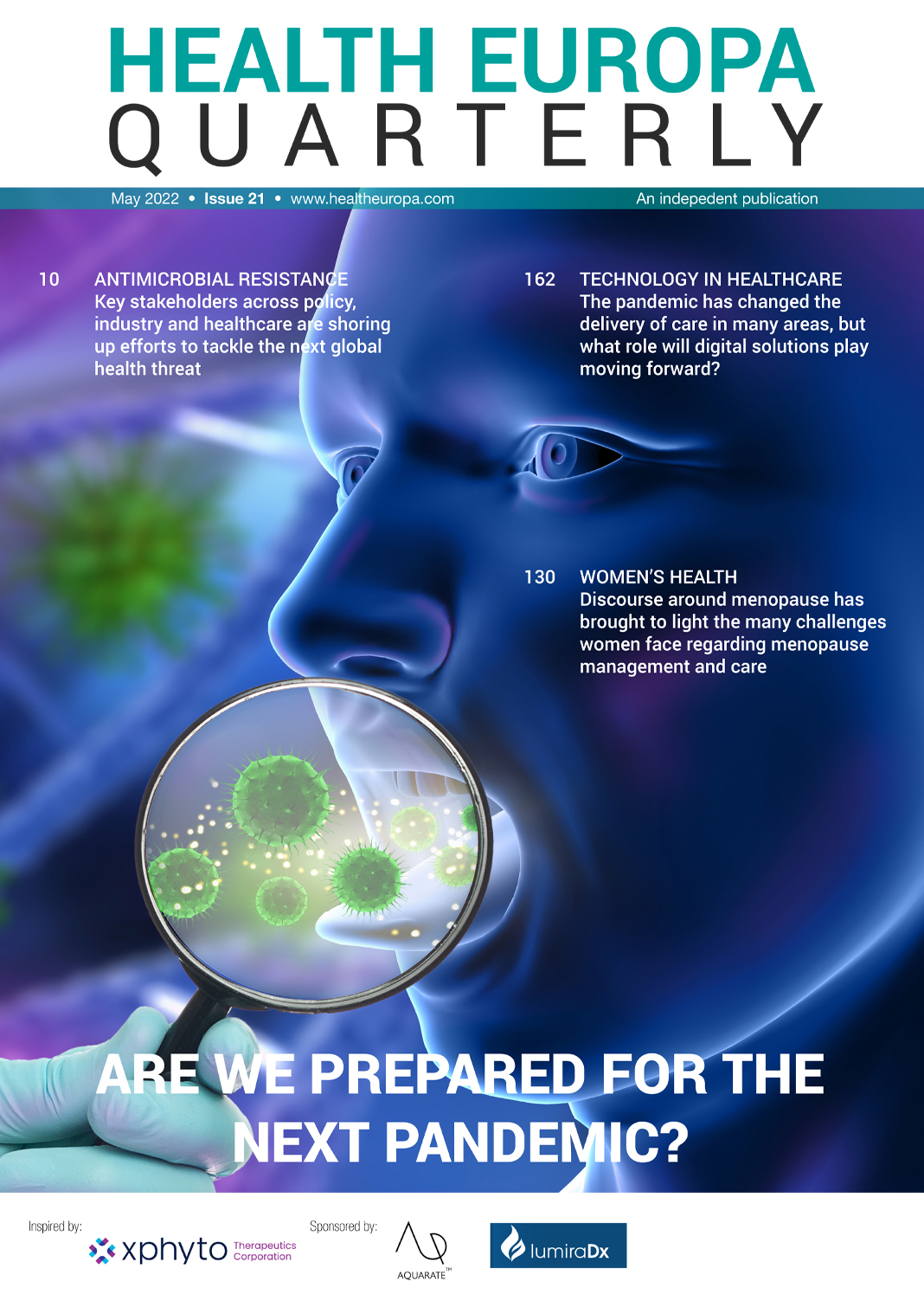Welcome to Health Europa Quarterly Issue 21, which insightfully explores women’s health, antimicrobial resistance, health policy, infection control, COVID-19, cutting-edge health technology, medical cannabis, and much more.
In his 1945 Nobel Prize acceptance speech, Alexander Fleming reflected on the dangers that penicillin posed to society should it ever be used incorrectly. Of the antibiotic, he said: ‘the ignorant man may easily underdose himself and by exposing his microbes to non-lethal quantities of the drug make them resistant.’ It is distressing to think that just over a century later antimicrobial resistance could reach such an overwhelming level that some have predicted as many as 10 million lives could be lost every year as a result. The burden of AMR is already heavily felt in many countries around the world where insufficient healthcare infrastructures and infection prevention strategies are fostering the spread of drug-resistance pathogens. Though efforts to tackle antimicrobial resistance have been overshadowed by the COVID-19 pandemic, what solutions to this equally threatening health crisis are being proposed? It is this question that forms the foundation of the thought-provoking pieces featured in Health Europa Quarterly Issue 21.
Opening our section on antimicrobial resistance and infection control is the European Centre for Disease Prevention and Control who share their thoughts on strategies to aid public health preparedness among the Member States in the fight against AMR. Joining them are representatives of the Responsible Use of Medicines in Agriculture (RUMA) Alliance who discuss progress made regarding antibiotic use in the sector and the critical role of data in shaping meaningful targets. Given the urgent need to facilitate a sustainable market for new antibiotics, Health Europa spoke to CIO of AMR Action Fund, Martin Heidecker about the barriers slowing antibiotic innovation and how the Fund is supporting a viable ecosystem for antimicrobial R&D and investment. The global AMR crisis can only be tackled through high level, cohesive action and with this in mind, we hear from the secretariat of the MEP Interest Group on Antimicrobial Resistance about the urgent need to drive forward the policy agenda and how the group is committed to realising this task.
With the onset of the COVID-19 pandemic, the importance of hand hygiene and infection prevention strategies were thrown into sharp relief. Sabiha Essack, expert panellist and AMR advisor to the Global Hygiene Council discusses the integral role of hand hygiene in mitigating the spread of AMR. We also hear from Linda Dickey, president of the Association for Professionals in Infection Control and Epidemiology (APIC) about how we can maintain levels of hand-hygiene compliance in the post-COVID era. We also share insightful features on the emerging role of UV disinfection, supporting an antibiotic-free supply chain for food, and the promotion of patient-centred care.
Our subsequent Diseases & Conditions section includes an illuminating interview with interim CEO of EIT Health, Jean-Marc Bourez who highlights developments in cutting-edge health innovations that will enhance diagnostics and disease management and support the democratisation of care. Dr David A Pearce of the International Rare Diseases Research Consortium reflects on the unmet medical needs impacting rare disease patients and the solutions that could help. Unmet needs in menopause treatment and care is also discussed within our Women’s Health section where we speak to the founder of Menopause Support, Diane Danzebrink, as well as the chair of the British Menopause Society, Dr Haitham Hamoda.
Healthcare in Practice opens with a piece on the ‘Our Future Health’ research programme, the UK’s largest-ever health project aimed at transforming the prevention, detection, and treatment of chronic diseases. In this section, we also discuss the ways in which the COVID-19 pandemic has impacted the global nursing workforce with the CEO of the International Council of Nurses, Howard Catton. In a similar vein, Luna Williams explores the impact of the COVID-19 pandemic on locum GPs.
Following the uptake of digital healthcare solutions, Moz Siddiqui, head of Strategic Innovation and Partnerships at Gavi speaks to Health Europa Quarterly about key considerations in the adoption of new technologies and some examples of initiatives that are supporting Gavi’s immunisation efforts. Completing this issue is an interview with The Centre for Medicinal Cannabis regarding the exportation of UK medical cannabis.
I hope you find the following articles as fascinating as I have in their collation, and should you have any suggestions for topics we should cover please let us know by emailing editor@healtheuropa.com
Lorna Rothery
Editor
Health Europa Quarterly



